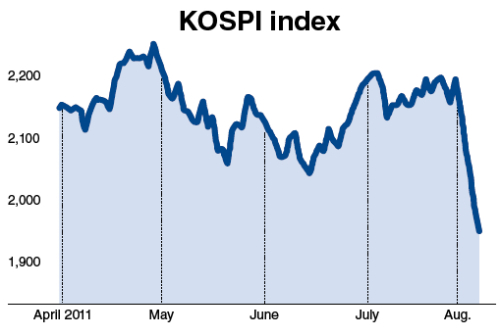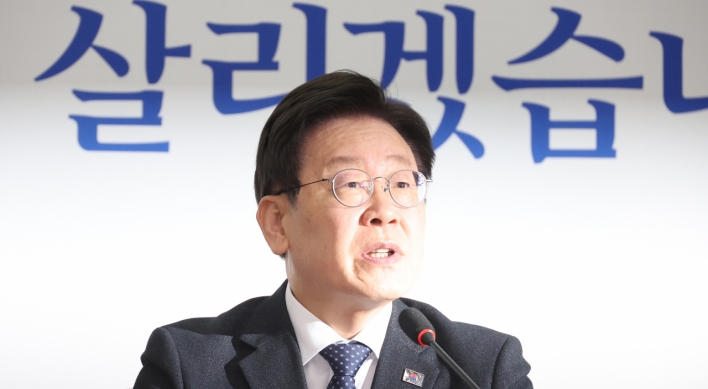Korean banks see risks grow to eight-month high
Korea has seen its stocks plummet the most among major Asian markets over the past four days after the U.S. and European fiscal woes hit the global markets.
The KOSPI tumbled by 10.5 percent last week, posting the sole double-digit fall among the major indices of Japan, China and Taiwan.

After closing at 2,172.31 last Monday, the KOSPI continued to drop by about 2 percent on average between Tuesday and Thursday.
With the plunge of 3.7 percent last Friday, the index lost 228.56 points over the past four trading sessions.
Taiwanese stocks fell by 9.75 percent, followed by Hong Kong with 7.58 percent, Japan with 6.67 percent and China with 2.86 percent.
The main factor seen by analysts is the high ratio of foreign investment in the local bourse, possibly making it vulnerable to external woes.
Foreigners hold about 31 percent of the nation’s stocks, one of the higher levels along with Taiwan at 32 percent, compared to nations such as Thailand (20.7 percent) and Singapore (23.7 percent).
Nomura Securities has predicted ― in its recent report ― that Korea’s economy is exposed the greatest risk to European financial difficulties among major Asian countries.
The Japanese brokerage house said Korea has the greatest amount of exposure at 47 billion won ($44.3 million), exceeding Singapore with 42 billion won, China with 41 billion won and Hong Kong with 35 billion won.
Furthermore, Korean banks saw their risks grow to the highest level in eight months, according to the Korea Center for International Finance and the local securities industry.
The premium of the five-year “credit default swap” on foreign currency-denominated bonds, held by the nation’s seven major commercial banks, climbed to an eight-month high of 140 basis points on Aug. 5 since it recorded 143.2 basis points at the end of November.
The CDS premium, a financial derivative product, rises in proportion to growing risks.
The CDS premium surged last Friday after hovering over the 120bp level between Monday and Thursday.
“This means banks’ borrowing conditions are getting worse,” an official of the KCIF said. “If the stock prices fall further and investors’ sentiment is further undermined, the index will possibly rise more.”
But several research analysts downplayed the current situation involving risks of the nation’s financial markets.
“Korea’s being picked as the most susceptible country to external factors is a story from the distant past,” a Samsung Securities analyst said.
Though foreigners have been selling Korean shares, they are also buyers of bonds, he said. “This indicates that they regard the Korean currency as a relatively safe asset.”
A Hyundai Securities analyst compared the situation in 2008, when the nation posted a deficit in its current account balance, with 2011 when the balance enjoyed a surplus.
By Kim Yon-se (kys@heraldcorp.com)
Korea has seen its stocks plummet the most among major Asian markets over the past four days after the U.S. and European fiscal woes hit the global markets.
The KOSPI tumbled by 10.5 percent last week, posting the sole double-digit fall among the major indices of Japan, China and Taiwan.

After closing at 2,172.31 last Monday, the KOSPI continued to drop by about 2 percent on average between Tuesday and Thursday.
With the plunge of 3.7 percent last Friday, the index lost 228.56 points over the past four trading sessions.
Taiwanese stocks fell by 9.75 percent, followed by Hong Kong with 7.58 percent, Japan with 6.67 percent and China with 2.86 percent.
The main factor seen by analysts is the high ratio of foreign investment in the local bourse, possibly making it vulnerable to external woes.
Foreigners hold about 31 percent of the nation’s stocks, one of the higher levels along with Taiwan at 32 percent, compared to nations such as Thailand (20.7 percent) and Singapore (23.7 percent).
Nomura Securities has predicted ― in its recent report ― that Korea’s economy is exposed the greatest risk to European financial difficulties among major Asian countries.
The Japanese brokerage house said Korea has the greatest amount of exposure at 47 billion won ($44.3 million), exceeding Singapore with 42 billion won, China with 41 billion won and Hong Kong with 35 billion won.
Furthermore, Korean banks saw their risks grow to the highest level in eight months, according to the Korea Center for International Finance and the local securities industry.
The premium of the five-year “credit default swap” on foreign currency-denominated bonds, held by the nation’s seven major commercial banks, climbed to an eight-month high of 140 basis points on Aug. 5 since it recorded 143.2 basis points at the end of November.
The CDS premium, a financial derivative product, rises in proportion to growing risks.
The CDS premium surged last Friday after hovering over the 120bp level between Monday and Thursday.
“This means banks’ borrowing conditions are getting worse,” an official of the KCIF said. “If the stock prices fall further and investors’ sentiment is further undermined, the index will possibly rise more.”
But several research analysts downplayed the current situation involving risks of the nation’s financial markets.
“Korea’s being picked as the most susceptible country to external factors is a story from the distant past,” a Samsung Securities analyst said.
Though foreigners have been selling Korean shares, they are also buyers of bonds, he said. “This indicates that they regard the Korean currency as a relatively safe asset.”
A Hyundai Securities analyst compared the situation in 2008, when the nation posted a deficit in its current account balance, with 2011 when the balance enjoyed a surplus.
By Kim Yon-se (kys@heraldcorp.com)



![[Herald Interview] 'Amid aging population, Korea to invite more young professionals from overseas'](http://res.heraldm.com/phpwas/restmb_idxmake.php?idx=644&simg=/content/image/2024/04/24/20240424050844_0.jpg&u=20240424200058)






![[Hello India] Hyundai Motor vows to boost 'clean mobility' in India](http://res.heraldm.com/phpwas/restmb_idxmake.php?idx=644&simg=/content/image/2024/04/25/20240425050672_0.jpg&u=)






![[Today’s K-pop] NewJeans' single teasers release amid intrigue](http://res.heraldm.com/phpwas/restmb_idxmake.php?idx=642&simg=/content/image/2024/04/26/20240426050575_0.jpg&u=)